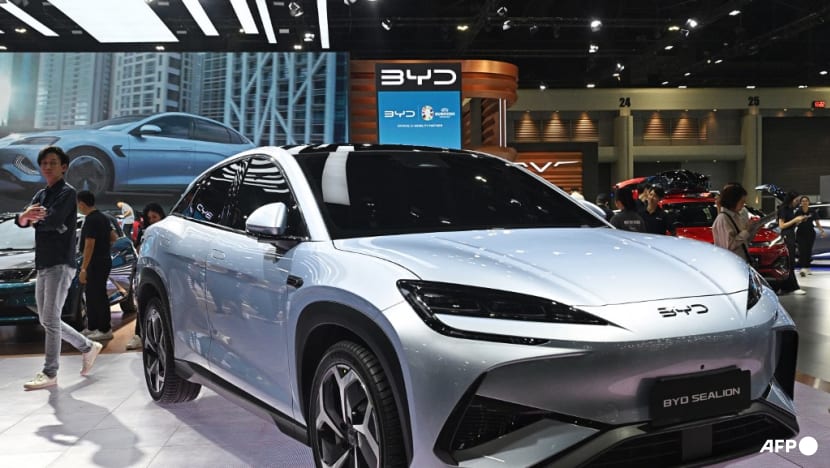China's BYD opens EV factory in Thailand, first in Southeast Asia

A BYD Sealion car by Chinese electric vehicle (EV) manufacturer BYD Auto is seen at the Bangkok International Motor Show in Nonthaburi on Mar 27, 2024. (File photo: AFP/Lillian SUWANRUMPHA)
RAYONG, Thailand: China's BYD opened an electric vehicle plant in Thailand on Thursday (Jul 4), the automaker's first factory in Southeast Asia, a fast-growing regional EV market where it has become the dominant player.
"Thailand has a clear EV vision and is entering a new era of auto manufacturing," BYD CEO and president Wang Chuanfu said at the opening ceremony. "We will bring technology from China to Thailand."
The BYD plant is part of a wave of investment worth more than US$1.44 billion from Chinese EV makers who are setting up factories in Thailand, helped by government subsidies and tax incentives.
Hong Kong-listed shares of the automaker rose 3.2 per cent to HK$237.60, their biggest intraday jump since Jun 13.
By 2030, Thailand aims to convert 30 per cent of its annual production of 2.5 million vehicles into EVs, according to a government plan.
Thailand is a regional auto assembly and export hub and has long been dominated by Japanese car makers such as Toyota Motor, Honda Motor and Isuzu Motors.
"BYD is using Thailand as a production hub for export to ASEAN and many other countries," said Narit Therdsteerasukdi, secretary-general of Thailand's Board of Investment, referring to the 10-nation Southeast Asian bloc.
The facility, announced two years ago, is worth US$490 million and will have a production capacity of 150,000 vehicles per year, including plug-in hybrids.
The sprawling factory in eastern Thailand's Rayong district will employ around 10,000 workers, some of whom were seen operating machinery on Thursday as under-construction bodies of BYD's Dolphin model moved through an assembly line.
"We will also assemble batteries and other important parts here," said Liu Xueliang, BYD's Asia Pacific general manager.
Thailand is the largest overseas market for BYD, which commanded a 46 per cent share of the country's EV segment in the first quarter and is the third-largest player in passenger cars, according to research firm Counterpoint.
Other EV rivals in the local market include Tesla and Great Wall Motor, which also has a production facility in Thailand.
BYD dealers in Thailand, however, are currently under scrutiny following a consumer complaint over aggressive discounting that has left some buyers upset with how much they paid for their cars.
BYD overtook Tesla in the fourth quarter of 2023 to become the world's top seller of electric vehicles.
Tesla reclaimed the top spot in the first quarter of this year, but BYD is bullish about its expansion, insisting last month it would press ahead with a second factory in the EU.
China has led the global shift to electric vehicles, with almost one in three cars on its roads set to be electric by 2030, according to the International Energy Agency's annual Global EV Outlook.
The Chinese automaker recorded a record annual profit of 30 billion yuan (US$4.1 billion) last year, but in April reported lower-than-expected revenue for the first quarter of 2024.
BYD has faced a bitter price war in China, where a staggering 129 EV brands are slugging it out - with only 20 achieving a domestic market share of 1 per cent or more, according to Bloomberg.

















